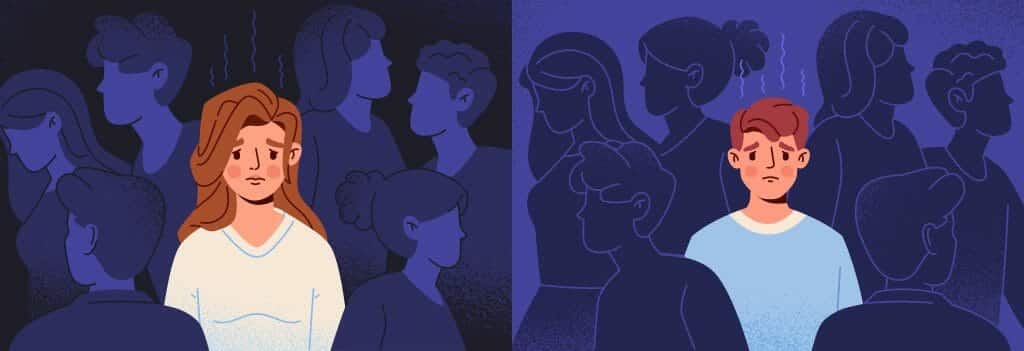I glanced at the time on the top right corner of the screen, pausing the swift scrolling of my thumb for a moment. 2:45 AM. My sleep schedule was ruined once again. I shrugged off the thought. What was the point of going to bed?
Tomorrow would just start another cycle of online classes, procrastinating my homework and missing the days when I saw my friends and family regularly. I turned back to TikTok and clicked on a livestream. A friendly voice traveled through my earbuds, providing the illusion of companionship. For a moment, I ignored that feeling in the pit of my stomach, telling me I was alone.
My freshman year of college was 2020, a year dominated by the COVID-19 pandemic. I decided to live on-campus despite an entire schedule of virtual classes, tired of spending the summer in my house. I was isolated from the majority of my peers, some of whom managed to initiate new friendships in the midst of social distancing. My situation improved once it became safe to resume in-person courses and activities.
Still, college remained socially different from grade school. Classes only consume three or four hours per day, compared to the eight hours formerly demanded. For better or for worse, most students no longer come home to their families. Participation in social activities is largely up to you, not the school or your parents. Instead of experiencing “the best time of our lives,” as some consider college, many students are left with loneliness.
Loneliness On The Rise
According to Psychology Today, loneliness is “a state of distress or discomfort that results when one perceives a gap between one’s desire for social connection and actual experience.” It is separate from enjoying time to oneself or intentionally limiting one’s social circles. Rather, it stems from an unfulfilled wish to socialize. My first year of college was indeed lonely, as I was disappointed by my lack of newfound friendships.
Even in a post-pandemic world, lonesomeness in young people persists. A 2021 Harvard report states that 61% of American 18-25 year-olds are miserably lonely. This contradicts the message that freshly initiated adulthood is enjoyable and carefree. In fact, individuals in this age range may be more susceptible to such issues than seniors. A 2023 advisory from the U.S. Surgeon General declares that while adults older than 65 years are more prone to social isolation, young adults are nearly twice as likely to report loneliness.
While my unwanted solitude was certainly exacerbated by the pandemic, this general trend may have begun even before the worldwide shutdown. The 2023 advisory acknowledged that loneliness rates in young adults have increased consistently from 1976 to 2019. In line with these findings, a 2018 study from Germany found that 32.4% of university students felt at least moderately lonely, while 3.2% were severely lonely. Isolation is not novel to college attendees.
Loneliness results in more than a feeling of “missing out.” The CDC identifies loneliness as a potential risk factor for heart disease, addiction, and even earlier death. Furthermore, it is more likely to befall certain demographic groups.
Women, single individuals, and those living alone are more susceptible to loneliness, according to a 2020 Norwegian study conducted on college students. However, the rate of extreme loneliness in college men nearly doubled from 2014 to 2018. With such serious health consequences, it is necessary to address this rising issue in young people.

Fighting Back Against Loneliness
Transitioning into a new environment is difficult, whether you live at home or in a dorm, out of state or five minutes away from where you grew up. Loneliness is not an inevitable fate, though. Some suggestions for combating loneliness from VeryWell Mind include joining a club, volunteering, strengthening existing relationships, practicing self-care, and seeking out a therapist.
Clubs and volunteering can provide a sense of purpose outside of academics while offering repeated opportunities to meet people with common interests. The marching band is my primary social outlet.
As I enter my eighth year in color guard, I am grateful for the many connections I forged thanks to this activity. Some of my favorite memories from freshman year are with my roommate, who convinced me to join guard with her in high school. Aside from prompting cherished friendships, membership in a team or organization reinforces feelings of togetherness. We trudge through the highs and lows of college, knowing we can rely on this support system.
@Psych2Go on YouTube, a channel dedicated to making psychological information accessible to general audiences, offers four tips for coping with loneliness. I especially appreciate their suggestion to reach out through compassion. Simply complimenting someone can initiate a conversation, which could lead to a friendship. Even if the interaction goes no further, it is fulfilling to extend a kind hand to another. Who knows? They could be struggling with loneliness as well.
Cheesy As It Is, We Are In This Together
I enter my final year of undergrad more comfortable with myself and the people I choose to spend my time with. My friendships encouraged me to expand my horizons; the people I met all contributed a piece of who I am today. I am excited for a year of celebrating the wonderful relationships in my life and fostering new ones. It still takes work to socialize sometimes.
There is always the option to seethe in jealousy toward those who appear to have more friends or more fun. It is valuable to remember that everyone is on their own journey. Each path is unique, and that is okay. It is great, actually.
The next time you see someone drop a pen on the way to class or want to compliment someone’s silly socks, show some kindness. You never know what someone is going through, and you just might make a friend.














